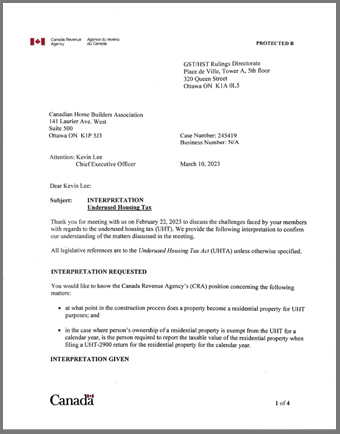Underused Housing Tax Act
 Underused Housing Tax Act
Underused Housing Tax Act
Win for residential construction industry regarding Underused Housing Tax
In a major win for the sector over unnecessary red tape, the federal government has very quietly eliminated the need for all private corporations to file an Underused Housing Tax (UHT) return (UT-2900), given they were never subjected to pay the tax. After rigorous advocacy from CHBA, including participating in the consultation on proposed changes to the UHT, revisions have been made including who is required to file an annual return. This government link outlines the changes. CHBA encourages members to seek professional accounting and tax advice to ensure that your company structure fits under the revised rules.
October 31, 2023 – Underused Housing Tax filing deadline extended
The Federal Government has announced a last-minute deadline extension for residential property owners who must file an annual Underused Housing Tax (UHT) Return for the 2022 tax year. The deadline has now been extended to April 30, 2024 for the 2022 tax year. The previously extended deadline was October 31, 2023. CHBA has been actively advocating for an industry exemption to this requirement and this deadline extension will provide more time to continue to seek that exemption.
Earlier in 2023, through rigorous advocacy, CHBA was able to secure an administrative-reducing and cost-saving interpretation on the UHT. At that time, the Canada Revenue Agency (CRA) also provided more time for affected builders/developers to file. While the deadline to file was still April 30, 2023, no penalties or interest would be applied to UHT returns and payments that the CRA received before November 1, 2023. That deadline has now been extended to April 30, 2024.
Further information is contained on the CRA website.
CHBA remains engaged with federal officials on trying to get an industry-wide exemption to having to file the UT-2900—this extension offers more opportunity to continue to seek it.
March 28, 2023 - Update to Canada Revenue Agency filing deadline for the Underused Housing Tax
Further to CHBA’s update below of March 20th below on the Underused Housing Tax (UHT), the Canada Revenue Agency (CRA) has now provided an important update for the filing deadline for form UHT-2900. Acknowledging the challenges to those required to file an underused housing tax return, as communicated to the CRA by CHBA, the CRA is providing more time for affected owners to file. The application of penalties and interest under the Underused Housing Tax Act for the 2022 calendar year will be waived for any late-filed underused housing tax (UHT) return and for any late-paid UHT payable, provided the return is filed or the UHT is paid by October 31, 2023. While the deadline to file is still April 30, 2023, no penalties or interest will be applied for UHT returns and payments that CRA receives before November 1, 2023. Further information is contained on the CRA website.
March 20, 2023 Update - CHBA successful in getting administration-reducing/cost-saving interpretation on the Underused Housing Tax
CHBA has been steadily working with government officials in the offices of the Minister of Finance and Minister of Revenue, as well as the Canada Revenue Agency, to find a solution to the unnecessary red tape caused by the new Underused Housing Tax (UHT) that is impacting the home building industry. CHBA is actively advocating for industry to be completely excluded from UHT tax filing, but in the meantime, has secured two very important interpretations, one providing clarity and one greatly reducing the level of effort to complete the UHT tax return.
CHBA has secured clarification on what constitutes “substantially completed” as it pertains to the construction of a residential property, which was a key concern for members. Very importantly, CHBA has also successfully secured an interpretation to avoid requiring filing a taxable value (assessed or sale price, Lines 280 and 285 of UT-2900) of a property if the owner is exempt from paying any tax, which greatly minimizes the reporting burden.
Letter from CRA to CHBA Re: Underused Housing Tax (March 10, 2023)
No Requirement For Most Members to Complete Taxable Value Lines
In the interpretation letter from CRA to CHBA, it states: “the CRA position is that a person is not required to report the amounts on Lines 280 and 285 of the UHT-2900 return with respect to the taxable value of the residential property in situations where both of the following conditions are met:
- No tax is payable in respect of the residential property for a calendar year due to the person’s ownership of the residential property being exempt from the UHT for the calendar year; and
- The person files the UHT-2900 return by December 31 of the following calendar year. For example, the return for the 2022 calendar year is filed by December 31, 2023.” [CHBA note: despite the confusing nature of this line, the deadline for filing is still April 30 – see below.]
Therefore, for members that are exempt from paying the tax due to their ownership structure (e.g. Specified Canadian Corporations, Specified Canadian Partnerships, Specified Canadian Trusts), they are not required to report on Line 280 (assessed value) and Line 285 (sale price).
For completing the forms electronically, CRA has confirmed that a value of ZERO (0) can be put in lines 280 and 285 by builders-developers who do not have a property assessment notice at the time of the UHT-2900 return filing date. The CRA will be publicly announcing this position shortly.
Note that to be eligible to report zero for Lines 280 and 285, the return must be filed by December 31; however, penalties for late filing begin April 30, so members should still file by April 30, which, while still inappropriate red tape, will now be much less work.
This interpretation secured by CHBA will dramatically reduce the level of effort for completing the returns, enabling members to simply enter the company information, the address of the unit, check their appropriate exemption box, and complete their election. While a return must still be filed for each unit (and CHBA continues to seek a complete exclusion for industry for this), this is a substantial win for the Association and its members, under the circumstances, in terms of time and cost savings for filing for this year.
Clarity on Substantial Completion
Regarding clarity on substantial completion, according to discussions with the Canada Revenue Agency, and confirmed via the CRA interpretation letter received by CHBA, the CRA considers a property to become a residential property for UHT purposes “when construction of the property is substantially completed (generally, 90% or more) so that an individual could reasonably inhabit the property.” CRA goes on to note that “a residential property may be considered to be substantially completed even if there are outstanding minor repairs, adjustments or upgrades, since this will not reasonably impair the use and enjoyment of the property as a place of residence. Whether the construction of a property is substantially completed on a particular day is a question of fact, and builders/owners of properties will have to make that determination on a case-by-case basis.” This is consistent with substantial completion interpretations for GST/HST filings.
Furthermore, it is important to note that per CRA there is no obligation to file a return “for a property for a calendar year if the construction of the property is not substantially completed on December 31 of the calendar year.”
CHBA Ongoing Advocacy for Full Exclusion
The above should provide substantial relief for CHBA members.
CHBA continues to advocate for a full exclusion for builders, renovators and developers from having to file the UHT-2900. However, a full exclusion will likely require a change to the legislation itself, which will take a longer period of time. In support of CHBA’s advocacy on seeking a full exclusion, members are still encouraged to contact their MPs about how builders, developers and renovators should be excluded from having to file UHT-2900 returns.
February 5, 2023
The federal Underused Housing Tax (UHT) Act unfortunately can affect nearly all builder and developer members across the country. Hopefully you have already been contacted by your accountant about this issue, but in case you haven't, please note the following (and what CHBA is doing about it).
While the Act states that newly built housing units are not subject to the Underused Housing Tax, all private corporations – therefore all builders and developers that are not publicly owned – are now required to file an Underused Housing Tax return (UT-2900) each year. This requires residential property owners (with some exceptions), including those with no foreign ownership, to file an annual UHT return for each housing unit owned on or after December 31, even where no tax is payable. Significant penalties apply if the UHT return is not filed by the deadline of April 30. CHBA is actively advocating against this situation, since builders and developers will now be encumbered with unnecessary red tape and accounting expenses to file tax returns for a tax that does not even need to be paid, since newly built housing units are exempt.
For more details, CHBA Alliance Network partner MNP, one of Canada’s leading accounting, consulting, tax, and digital services firms, has a very thorough overview of the Underused Housing Tax Act. We encourage you to read it to find out if and how this applies to your company.
Details on this tax have been slow to emerge, and many questions remain and clarifications are still needed. Indeed, the actual UT-2900 form only came out last week. Given the unacceptable situation this is placing our industry in, CHBA is asking that the federal government immediately implement an exemption so that builders and developers will not have to file a tax return for their newly constructed housing units for which they still possess title. It is unknown at this time if such an adjustment will be possible in time for this year’s filing deadline. Therefore unfortunately, and until further notice, members should proceed as if the UHT rules will proceed as they currently are published.
Given that these filings are due April 30th (in reality, May 1st this year since April 30th is a Sunday) and the government is being very slow to react to the issue confronting our industry, you may wish to contact your local Member of Parliament to express your grave concern over this bureaucratic red tape that will cause work and expense for your company and for all of Canada’s corporations in home building and development - businesses that are working to add more housing supply, now burdened with red tape that will add unnecessary additional costs to housing. If your residence and your business are located in different ridings, we would also encourage you to contact the MPs for both. Please see here for contact information for your Member of Parliament.
CHBA will continue advocating to get this administrative burden removed from our industry, and to update membership on progress made in seeking an exemption.

